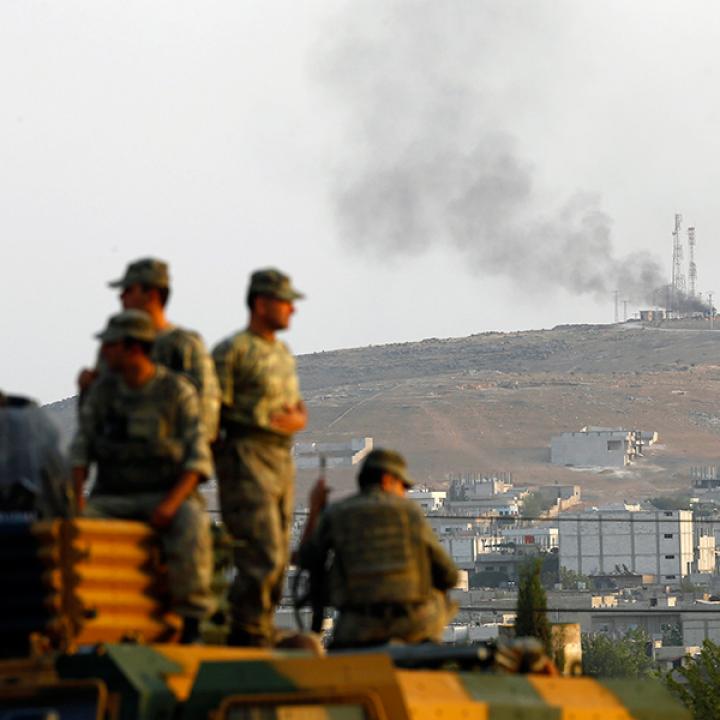

Why is Turkey suddenly passionate about helping fight Da’esh?
November 17, 2016
Under the supervision of the international coalition led by the United States, the Iraqi government and Kurdish forces will coordinate to liberate Mosul and expel Da'esh in the process.. In response, the Turkish government has dramatized its stance by fabricating problems and escalating its rhetoric, even trying to prevent the battle from beginning in order to establish a new vision for the operation that would grant Turkey a pivotal role. More specifically, Turkish politicians have discussed their country’s participation in the operations in a manner that departs from diplomatic norms, sometimes playing on sectarian tensions by painting their country as ‘the protector of Sunni Islam.’ Other politicians have played on ethnic tensions by promoting the idea that Mosul is a Turkish city, feeding on the sensitivity of Turkmen in Mosul.
These methods pushed the Iraqi government to reject Turkey’s participation in the battle for Mosul. The issue has reached the point of both media escalation and a war of words between Baghdad and Ankara, violating traditional diplomatic norms. Turkish President Recep Tayyip Erdogan stated that he would resort to other options if the Iraqi government continued to insist that Turkey be excluded.
But all of this begs a few questions: Why is Turkey suddenly passionate about helping fight Da’esh? What stopped them from helping the Iraqi army and the Peshmerga two years ago when Da’esh seized control of Mosul and reached the outskirts of Erbil? What stopped Turkey from fighting Da’esh throughout the three years they have been neighbors across the border? With these questions, this article seeks to add to the discussion behind Turkey’s actions on the ground in Syria and Iraq, specifically with regard to their role in disrupting counterterrorism – and even humanitarian – initiatives in the region.
To illustrate, in an attack that stunned everyone, the Syrian Democratic Forces (SDF) gained control of several villages in the northern Aleppo countryside that were under the control of Da’esh. By surrounding Qarah Hill, they were able to gain control over several villages extended to the al-Shahbah Dam. The area surrounding the dam is considered to be of strategic importance, providing access to areas and villages in al-Bab.
Subsequently, the Turkish Army rushed to stop the advance of revolutionary groups aligned with the SDF. Turkish artillery bombarded the villages of Om Hosh, Harbel, Om Qura, and Ahras while Turkish government gave orders to the Euphrates Shield forces to attack and bomb al-Sheikh Aysa, Eid Daqna, al-Malkeya, and Kashta’ar. It did not stop there–Turkish warplanes shelled the villages of Al-Shahbah while the artillery bombed villages in Jindires, Sheya, and Rajo. None of these villages experienced clashes and all were located a significant distance from the fronts, nor did they contain any important military sites.
Working to create a state of chaos in Afrin by targeting villages in order to displace residents and creating a state of unrest in order to attack the popularity of the Peoples’ Protection Units are two of a growing list of contentious issues for Kurdish citizens in general and the families of martyrs killed in the battle to liberate Kobane. These groups have several questions for the international coalition led by the United States.
Why are they neutral about the massacres perpetrated against civilians and Syrian Democratic Forces fighters by the Turkish army in Afrin and al-Shahbah? Didn’t they agree, during the battle of Kobane, that Kurdish units would work together with the SDF and the international coalition in an alliance to fight terrorism and uphold humanitarian principles? Is the international coalition aware that Mahmoud Barkhdan, the hero of the battle to liberate Kobane and the Commander in Chief of the YPG Peoples' Protection Units in Afrin and al-Shahbah, is currently being targeted by Turkish planes? Or the fact that friends of Arin Mirkan have been killed by Turkish air strikes?
The turmoil witnessed in Turkish politics, and especially regarding their relationship to neighboring countries and the fight against terrorism, has made Turkey a country with dubious intentions. This has become especially true since Turkey began promoting the idea that Erdogan will lead the ‘new Ottomans’ . This project was taken without regard for the concerns among those who suffered genocide, massacres, and atrocities committed by the Ottomans, like the Armenians, Greeks, Syriacs, Kurds, and Arabs.
Indeed there is doubt that the Turkish government will address the issues of their war on terrorism in Syria and Iraq. Will they open channels of communication with national forces bearing popular and military weight on the ground without regard for race or religion? Will they then cooperate with the international coalition to bring the perspectives of all moderate parties with a national agenda and human morals in Syria and Iraq together to form a united front to combat terrorism? Alas, this is not in the interest of the Turkish state or the region in general.
If Turkey undertakes a real review of their policies with respect to the peoples of the region and positively contributes to the battles of Manbej and Mosul, Turkey could return to zero problems with neighboring states. Unfortunately, the state has acted otherwise thus far, and most Iraqis and popular Syrian and Iraqi movements reject a Turkish presence and role in the conflict, considering the country an occupying force.


